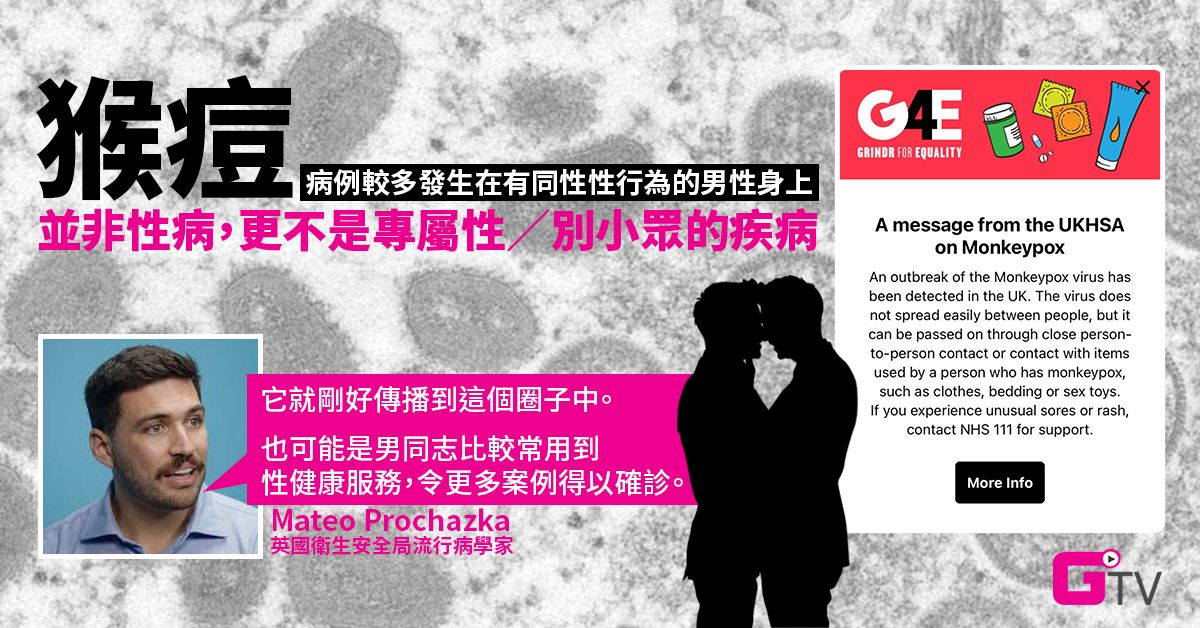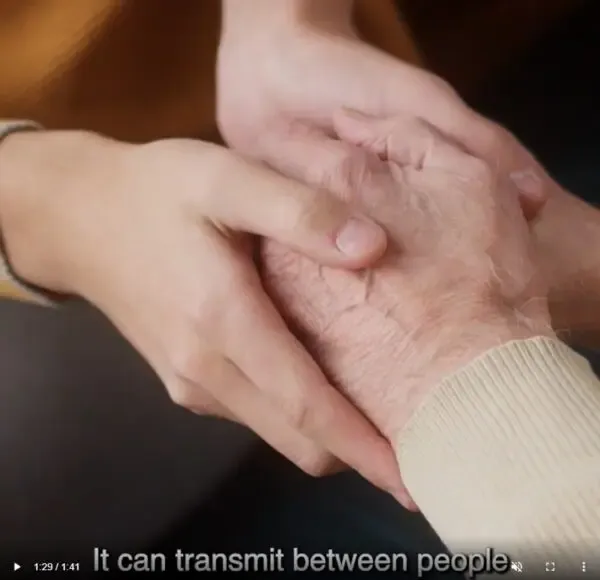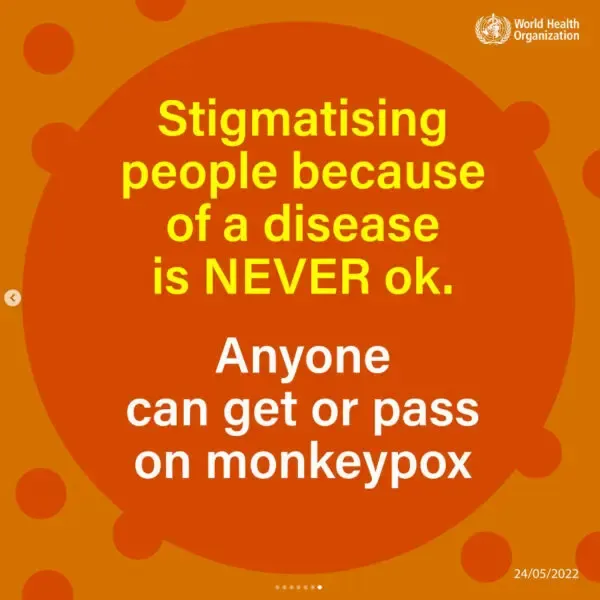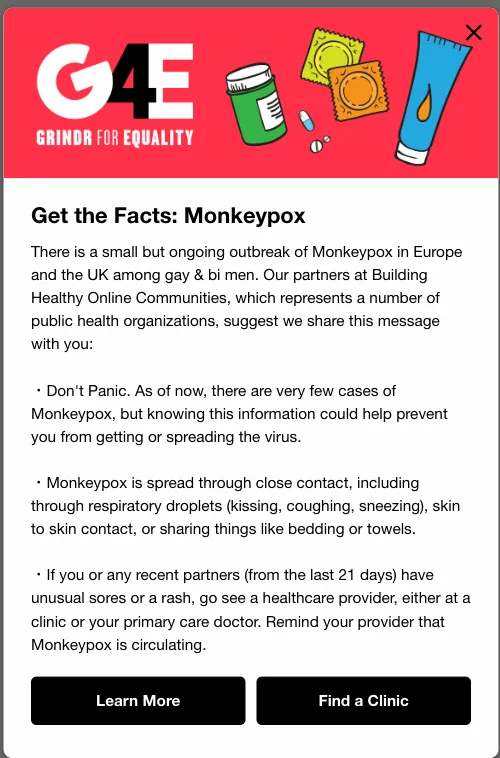[Monkeypox] Men who have sex with men become a high-risk group? Stigmatizing speech becomes a hindrance to disease control

Written by: Jansen
Text Editor: Jinner
Website Editor: Beth
While the world is still trying to restore order amid the Covid-19 pandemic, another virus, monkeypox, is spreading in nearly 60 countries. According to data from the World Health Organization as of July 4, the total number of infected people has exceeded 6,000, of which Europe has the most cases, accounting for more than 80% of the total. In addition to the worrying speed and scale of its spread, monkeypox has also drawn global attention for its multiple discrimination and stigma.
Because similar viruses were more prevalent in Africa than in Africa, and more recent outbreaks occurred in men who have sex with men, some members of the public and the media have directly linked monkeypox with Africans and gender/gender minorities, provoking the United Nations AIDS Programme. The practice "reinforces homophobic and racist stereotypes." In addition, some scholars believe that the name monkeypox is suspected of stigmatizing monkeys, and the WHO recently responded to various disputes, saying that it has decided to suspend the relevant name and announce a new name as soon as possible.
What is monkeypox?
Monkeypox is caused by the monkeypox virus, which belongs to the same family of viruses as smallpox, but is less severe than the latter. Symptoms include fever, headache, swollen lymph nodes, muscle aches, and a rash. Most monkeypox cases are mild and usually resolve on their own within a few weeks, but can be fatal in severe cases. According to the WHO report, three people have died so far in this round of the epidemic.
There is currently no treatment for monkeypox, but outbreaks can be controlled by preventing infection. The smallpox vaccine proved to be 85% effective in preventing monkeypox, and related antiviral drugs were equally effective.
Why is monkeypox more common among gender/gender minorities?
The WHO report shows that the group most affected by this round of monkeypox outbreaks is men who have sex with the same sex, and many of them have recently had new or multiple sexual partners.
However, monkeypox is not a sexually transmitted disease, nor is it a disease that is exclusive to a gender/gender niche. It can be transmitted through close contact with an infected person—including droplet transmission from prolonged face-to-face contact, as well as direct contact with bodily fluids (eg, sexual contact). Once the virus enters a community, there is a higher risk of infection among close-knit groups, such as family members and sexual partners.
In an interview with the BBC , Mateo Prochazka, an epidemiologist at the UK Health Security Agency, said it was unclear why the majority of monkeypox infected people were gay men and other gender/gender minority groups. “It just happened to spread to gay men, bisexual men and men who have sex with men, their circle.” Prochazka said another reason may be that gay men are more commonly used sexual health services, which has led to more cases being diagnosed. .

Stigma against the sex/gender niche returns after AIDS?
Monkeypox is more common among gender/gender minority groups such as gay men, creating the illusion that they are more susceptible to the disease. MIT Technology Review cited some of the worrying public reactions : some Twitter articles spread misinformation, claiming that countries with laws against anti-sex/gender rhetoric have the highest rates of monkeypox infections, and even called " God's Revenge"; some online posts about monkeypox on Facebook have anti-gay remarks that have been liked thousands of times but remain uncensored; a YouTuber with more than a million followers tweets that as long as you don't get involved with gay " Group sex,” avoiding being bitten by rodents and keeping groundhogs as pets can prevent monkeypox infection, the video has been viewed more than 100,000 times.
These remarks may have unimaginable consequences: infected people are afraid to report their illness or seek medical treatment, making the epidemic more difficult to control. “Stigma and blame can undermine trust and reduce the ability to effectively respond to such outbreaks,” UNAIDS Deputy Executive Director Matthew Kavanagh said in an open letter . Because these statements create a cycle of fear that discourages medical treatment, discourages case detection, and encourages ineffective punitive measures.”
Many people are more worried that this will repeat the mistakes of the AIDS crisis in the 1980s and 1990s, when homophobia devastated countless people like an earthquake, and there are still occasional aftershocks.

How to alert at-risk groups without being offensive? Government and civil society work together
Under the shadow of AIDS stigma, officials found themselves in a dilemma: they wanted to remind gay men and other gender/gender minorities to be extra careful as a group at high risk for monkeypox, but they were worried that such special reminders would cause discrimination.
Health officials in Salt Lake City, Utah, decided that they would distribute information about monkeypox at this year's gay parade, reminding people to avoid intimate interactions with people with certain symptoms, but the information said nothing about the gay community.
Sex columnist Dan Savage recently commented on his podcast that this is overkill: "Public health officials and journalists didn't sound the alarm during the AIDS crisis because they didn't care about our lives; now they don't. He cares too much about us."
In this embarrassing situation, gender/gender minority organizations have taken on the responsibility of blowing the whistle. The Washington Post reports that a clinic for gay men in Chicago is offering monkeypox prevention information during public health outreach at Mr. Leather International; Grindr, a gay dating app, recently issued two warnings about monkeypox; South A Florida LGBT community center held a town hall meeting on monkeypox before the Stonewall Gay Parade.

In June, the White House discussed monkeypox over the phone with advocates and nonprofits serving gay men. AIDS activist Peter Staley, who was part of the call, said it was a harrowing contrast to the 1981 AIDS crisis. "If the White House had contacted the LGBTQ community when the first AIDS cases were discovered in June and July 1981, we would definitely have had the chance to contain the outbreak in the United States," he said.

Further reading: Canada's removal of blood donation restrictions for niche men will be screened based on sexual behavior and non-sexual orientation
Original G-spot TV
Like my work? Don't forget to support and clap, let me know that you are with me on the road of creation. Keep this enthusiasm together!

- Author
- More